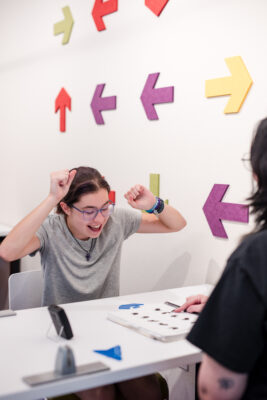If you’re the parent of neurodivergent kids, you already know that confidence doesn’t come easily. Too often, these kids spend their days feeling like they’re not measuring up—getting corrected, redirected, or reminded of what they “should” be doing. By the time they walk through the door after school, they may feel exhausted, discouraged, and convinced that they’ll never be “good enough.”
As parents, our hearts break when we see that spark dim in our child’s eyes. We want them to believe in themselves—to know they are capable, valuable, and loved. 👉The good news? There are ways to intentionally nurture confidence in neurodivergent kids, helping them grow into resilient, self-assured learners.
1. Focus on Strengths and Set Them Up for Success
Neurodivergent kids often hear about what they’re doing wrong. Flip the script at home by highlighting what they do well. Maybe your child is creative, empathetic, curious, or has a great sense of humor. Celebrate those strengths and give them opportunities to shine.
When you create situations where your child can succeed, you’re sending the powerful message: You are capable. Success, even in small doses, builds the momentum for bigger challenges.
2. Redefine Progress: How Far They’ve Come
It’s easy for kids (and parents) to get stuck looking at the gap between where they are and where they “should” be. Instead, celebrate how far they’ve come. Did your child read two more pages today than they could last month? Did they speak up in class after weeks of staying silent? Progress, no matter how small, deserves recognition.
This shift in perspective helps kids internalize that growth isn’t about perfection—it’s about movement forward.
3. Teach Self-Advocacy
Confidence grows when kids learn to use their voices. Encourage your child to speak up when they need help, to ask for clarification, or to explain their unique needs. Self-advocacy is a skill that will serve them far beyond the classroom, empowering them to navigate life with more independence and resilience.
Role-play scenarios at home to help them practice in a safe, supportive environment. The more comfortable they get with these conversations, the more confident they’ll feel in the real-world situations they’ll face on their own one day.
4. Model a Healthy View of Mistakes
Perfection is not the goal—progress is. Show your child that mistakes are part of learning, not proof of failure. Share your own challenges and how you’ve bounced back from them. Positive role models (whether you, a coach, or a favorite celebrity) can show kids that effort matters more than flawless outcomes.
5. Create a Safe Place to Land
School and social settings can be stressful for neurodivergent kids. Home should feel different—a place where they can exhale, regroup, and just be themselves. Give your child the freedom to practice new skills without fear of criticism. Encourage them to take risks, knowing that mistakes won’t lead to shame or harsh judgment.
This safe space also gives them room to release tension—whether that’s through play, movement, or quiet downtime. A calm, accepting home environment helps restore their confidence and energy for the next challenge.
At LearningRx, We Build More Than Cognitive Skills
Confidence grows when kids feel capable. That’s why at LearningRx, our brain training programs don’t just strengthen core learning skills—they also create daily opportunities for kids to face challenges and see themselves grow. With each small victory, they’re reminded that they can do hard things, and that message carries into every area of their lives.
If you’d like to learn how brain training can help your child build skills for confident learning, reach out to us today!

